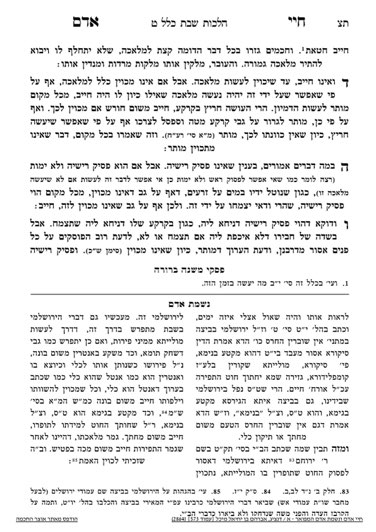We are continuing in siman 5. Yesterday, we learned about the concept of psik reisha and how it affects davar she’eino miskavein. In the parentheses, the Chayei Adam explains the meaning behind the choice of the words psik reisha. He writes that just like it is impossible to cut off the head of an animal without it dying, in the scenarios in question it is impossible to perform muttar action without an assur action occurring as well. Thus, using the example given to us by Chazal, if one drags a bench or bed on the ground, if the item is very heavy, or the ground is very soft, or the leg of the item is sharp, we would have reason to assume that dragging the object will result in digging a furrow.
It would appear from the above example that the secondary action is considered a psik reisha because it will certainly occur. If it is highly probable, but not definite, it is known as karov l’psik reisha. The Mishnah Berurah implies in multiple places that it is assur. One example he discusses is a case where a person wishes to open a door which is opposite candles in a way that the wind generated from opening the door will extinguish the candles. The language of the Shulchan Aruch is that it is assur because it might cause a psik reisha. The Biur Halacha explains that it is assur because it is a karov l’psik reisha, and is therefore treated like a psik reisha.
However, there are poskim who disagree, and hold that Chazal specifically used the mashal of psik reisha to describe this type of case to teach us that the caveat of psik reisha only applies when the secondary action is certainly inevitable. The Ritva in Yoma writes that if there is any possibility it will not happen, it is not considered psik reisha, as psik reisha must be inevitable. Rav Elyashiv and others follow this approach.
The type of psik reisha we discussed above is where action a causes action b. A different type exists as well. We will present the source today and the implications tomorrow.
Rav Akiva Eiger raises a question, based on a Rema in Yoreh Deah (siman 87). The Rema discusses a person traveling. People traveling would bring their own food and heat it up on the hearth, alongside the other visitors of the inn. Although there is no inherent concern from the non-Jewish/non-kosher pots, there is an issur of cooking meat and milk together, because when the pots may contain milk and meat, and whoever stokes the coals may be cooking meat and milk, which is an issur deoraysa. The Rema writes that one should not stoke the coals, even though it is only a safeik whether it contains basar b’chalav or not. As it is not a psik reisha, and it is not mechavein, it should be muttar. We will continue this question in the upcoming shiur, be’ezras Hashem.
Summary
- Davar she’eino miskavein is the general Torah concept of performing one action with an unintended aveirah which may occur in addition. We pasken in accordance with Rav Shimon, that it is muttar
- However, if it is inevitable that the unintended aveirah will occur, it is called a psik reisha that the unintended action will occur, and one becomes chayav mideoraysa for causing that unintended assur action to occur.
- If it is karov l’psik reisha, many consider it a psik reisha; however, Rabbi Reingold’s mesorah is not to treat it as psik reisha but rather as a davar she’eino miskavein.



